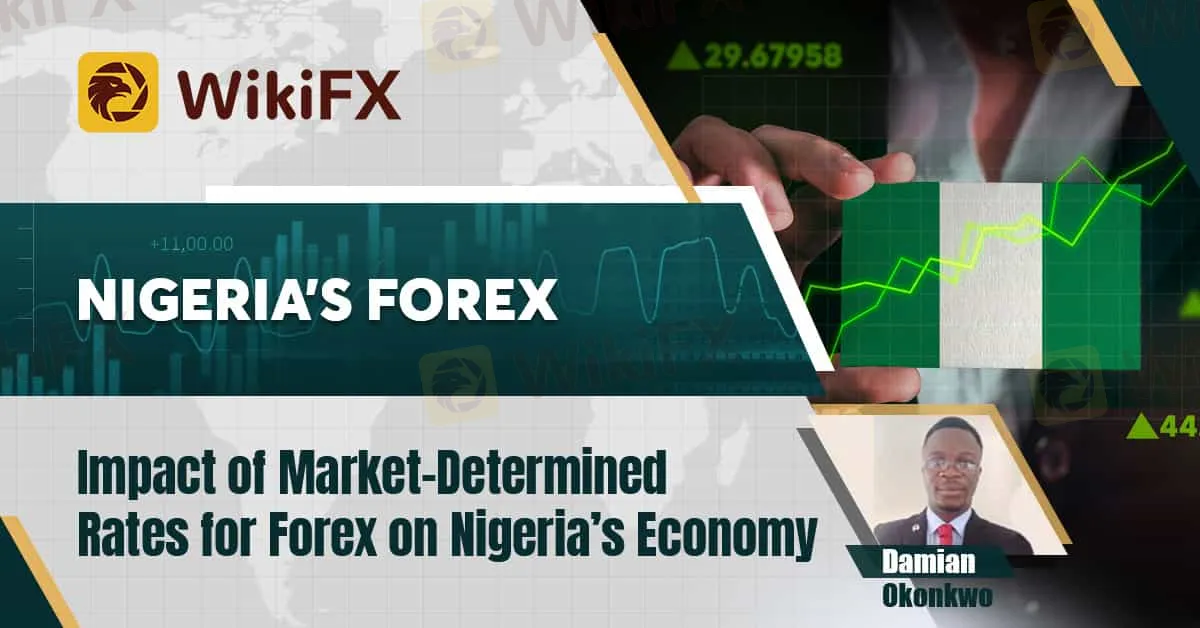Abstract:The shift towards market-determined forex rates presents both opportunities and challenges for the Nigerian economy. While increased efficiency, export competitiveness, and potential for higher government revenue are attractive propositions, managing inflation, exchange rate volatility, and the external debt burden require careful policy measures and economic diversification.

By: Damian Okonkwo

Introduction
The quest to meet the high forex demands in Nigeria has led the government to float the Naira at the Forex market and adopt a market-determined rate for forex rather than having the rate fixed by the CBN. This policy has brought more woes for the Naira which depreciated to record lows against other foreign currencies since the implementation of this policy in June 2023. This work exposes the benefits and disadvantages of having a market-determined rate for forex.
Meaning of Market-Determined Rates for Forex
Market-determined rates for Forex refer to exchange rates that are set by the forces of supply and demand in the forex market, rather than being artificially fixed by a central bank. This gives the market dealers more liberty to set the rate based on the principle of demand and supply rather than a fixed rate.
Potential Benefits of Market-Determined Rates for Forex
Here are some of the potential benefits of a running a market-determined rates for forex:
● Increased Efficiency and Transparency: A market-driven system removes artificial exchange rates, fostering a more efficient allocation of forex. Businesses can make informed decisions based on real-time market forces, reducing uncertainty and distortions.
● Trade Competitiveness: Market-determined Forex rates can significantly influence Nigeria's trade competitiveness. A flexible exchange rate allows the Naira to adjust based on supply and demand, impacting export and import dynamics. A depreciating Naira can make exports more competitive in international markets, potentially boosting the country's trade balance. Conversely, a stronger Naira may make imports more affordable but might pose challenges for export-oriented industries.
● Foreign Reserves and Economic Stability: Market-determined Forex rates influence the level of foreign reserves held by Nigeria. A flexible exchange rate system allows for a more natural adjustment to external economic shocks. However, excessive volatility may lead to reserve depletion if not managed prudently. Effective central bank interventions and policy measures become imperative to maintain an adequate reserve level, ensuring stability and confidence in the economy.
● Investor Confidence and Capital Flows: Market participants, including foreign investors, closely monitor Forex rates when making investment decisions. A stable and transparent Forex market enhances investor confidence. A fluctuating or volatile exchange rate can deter foreign investments, impacting capital inflows. Striking the right balance and providing clear policy signals is vital to attract and retain foreign capital, fostering economic growth and development.
● Improved Government Revenue: Export earnings and foreign direct investment, both potentially boosted by a market-driven system, can translate to higher government revenue in naira terms. This allows for increased investment in infrastructure and social programs.
Potential Challenges:
a) Import Price Inflation: A depreciation of the naira can lead to higher import prices, pushing up inflation. This can disproportionately impact low-income earners who spend a larger share of their income on essential imported goods.
b) Exchange Rate Volatility: Market-determined rates can be susceptible to fluctuations, creating uncertainty for businesses and hindering long-term planning. This volatility can discourage investment and disrupt economic growth.
c) Pressure on External Reserves: If demand for foreign currency outstrips supply, the Central Bank of Nigeria (CBN) may need to intervene to stabilize the exchange rate, potentially depleting external reserves.
d) Debt Burden: Nigeria has a significant amount of external debt denominated in foreign currencies. A weaker naira can increase the debt burden in naira terms, straining government finances.
Conclusion
The shift towards market-determined forex rates presents both opportunities and challenges for the Nigerian economy. While increased efficiency, export competitiveness, and potential for higher government revenue are attractive propositions, managing inflation, exchange rate volatility, and the external debt burden require careful policy measures and economic diversification. The long-term impact of this policy will depend on the effectiveness of these measures and Nigeria's ability to navigate the inherent complexities of a market-driven forex system.











